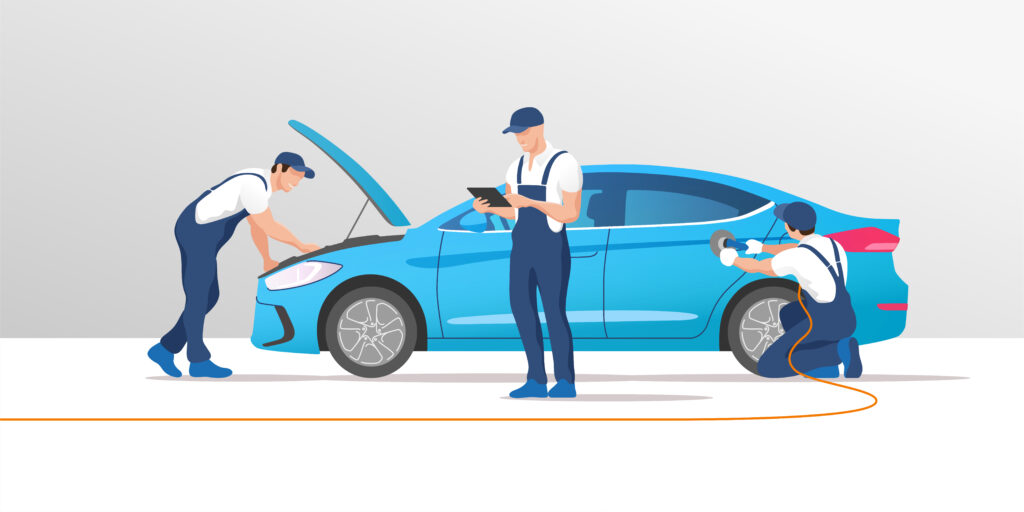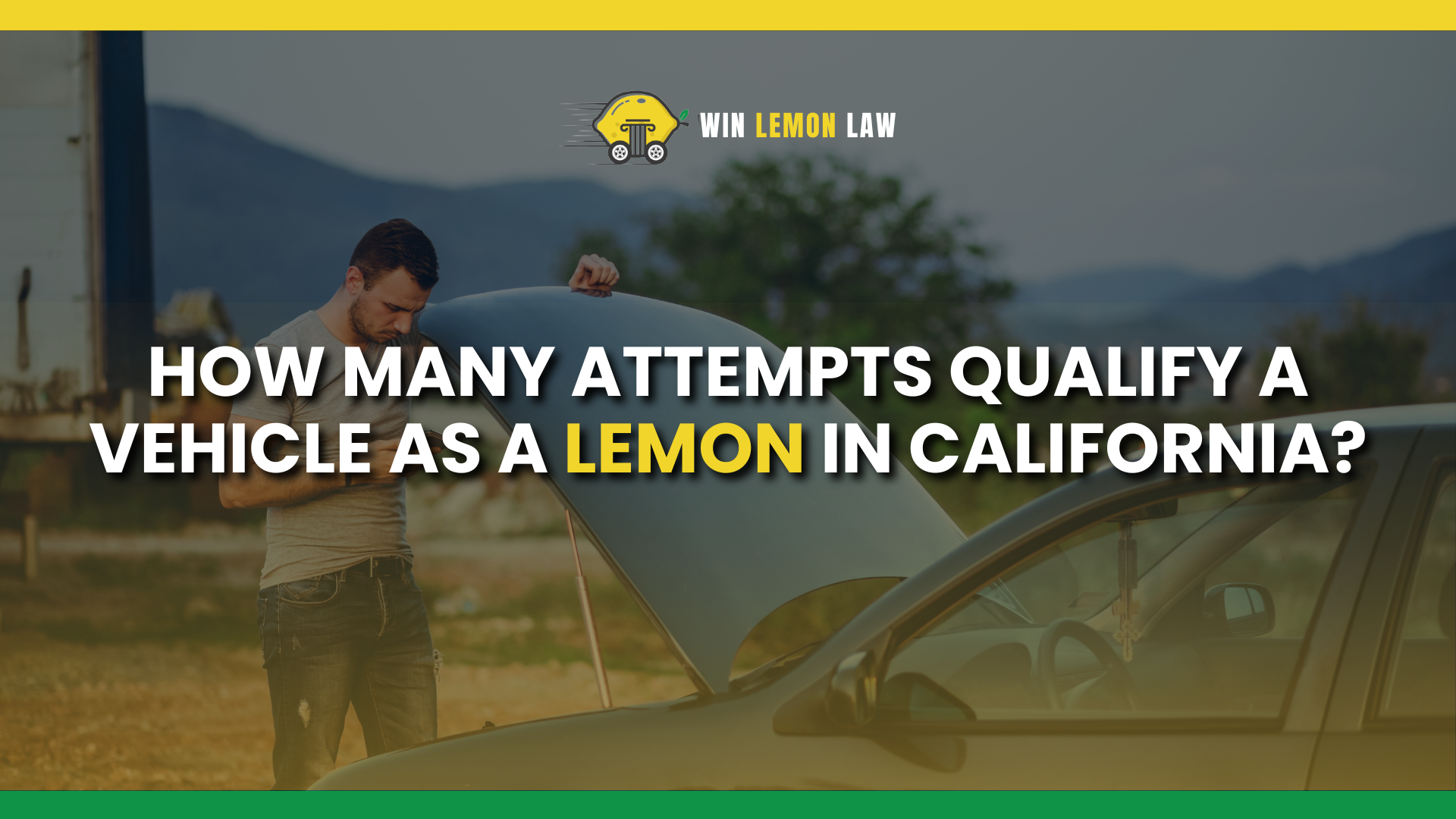Purchasing or leasing a new vehicle should be a moment of excitement and relief. For most drivers, it’s a symbol of reliability, convenience, and peace of mind. But what happens when that new car keeps breaking down, and repeated trips to the dealership provide no lasting fix? You’re left not only with frustration but also with a lingering question: At what point does your car legally qualify as a lemon?
This is one of the most common questions California consumers ask after dealing with ongoing vehicle defects. Repetitive repairs, extended time without a functioning vehicle, and evasive dealership responses can wear anyone down. Unfortunately, many drivers are unaware that California’s Lemon Law offers strong legal protections in exactly these situations.
Understanding how the law defines a “reasonable number of repair attempts” is essential if you want to take the next step. But it’s not always straightforward—this definition varies depending on the nature of the defect, the repair history, and how the issue affects your use and safety.
In this article, we’ll explain how the California Lemon Law works, how many repairs typically qualify a car as a lemon, what courts actually look for in these cases, and how you can build a strong case. If your vehicle keeps letting you down, this guide is your starting point to taking back control.
What Is the California Lemon Law?

The California Lemon Law, officially called the Song-Beverly Consumer Warranty Act, is a consumer protection law designed to protect buyers and lessees of new vehicles that turn out to have persistent problems. It applies to most new vehicles—including cars, trucks, SUVs, motorcycles, and some used vehicles that are still under the original manufacturer’s warranty.
To qualify, your vehicle must have a substantial defect that affects its use, value, or safety, and the manufacturer or its authorized repair facility must be given a reasonable number of attempts to fix it while under warranty. If the defect still exists after those attempts, you may be eligible for a refund, vehicle replacement, or financial compensation.
Importantly, you don’t have to prove negligence or fault. The focus is on whether the defect persists and whether you’ve given the dealership an opportunity to correct it. The law is on your side—even if the dealership says “this is normal” or tries to downplay the issue.
It’s also important to understand that Lemon Law protections extend to leased vehicles, not just purchases. If your leased car is constantly in the shop or displaying unresolved issues, you may still have a valid claim. This often comes as a surprise to drivers who assume leases don’t qualify.
In short, the California Lemon Law exists to prevent manufacturers and dealerships from selling or leasing you a defective car that continues to fail despite repeated efforts to fix it. If this sounds like your experience, read on.
What the Law Says About Repair Attempts
One of the most crucial questions in a lemon law case is: How many times must the dealership try (and fail) to repair the issue before the car is legally considered a lemon? While the law doesn’t give a rigid number, it provides useful guidelines that courts often refer to.
Generally speaking, your vehicle may qualify as a lemon if:
- It’s been in for two or more repairs for a defect that could cause injury or death—such as brake failure or steering malfunction.
- It’s been in for four or more repairs for a non-life-threatening issue that still significantly impacts your vehicle’s use or value—like faulty transmission or persistent electrical problems.
- It’s been out of service for 30 or more cumulative days due to repairs of warranty-covered defects, even if those visits didn’t fix the problem.
However, these are just benchmarks—not requirements set in stone. A judge or arbitrator will evaluate the totality of your situation. For example, if your car has only been repaired twice but the defect is a dangerous stalling issue on the freeway, that might be enough to establish your case.
What matters most is whether the issue continues to occur despite good faith repair attempts by the dealership. If your car is still under warranty and you’ve given the dealership repeated chances to fix it—without success—you may already meet the legal threshold.
Also, remember: the clock for qualifying attempts begins when the issue is first reported, not necessarily when it was first diagnosed. Always report issues immediately, document the symptoms in your own words, and request that each visit be properly recorded.
What Courts Look at Beyond the Numbers
It’s a common misconception that the number of repair visits is all that matters in a lemon law claim. In truth, California courts take a holistic approach, looking at the total context of your experience—not just how many times the dealership attempted a fix.
Here’s what else matters:
- The severity of the defect – Is the issue cosmetic, or does it impair your ability to drive safely?
- Consistency of the problem – Has the same issue been reported multiple times across repair orders?
- Impact on your daily life – Has it affected your commute, childcare, work, or overall mobility?
- Dealership’s documentation – Does the paperwork reflect what you actually reported and experienced?
Even if the dealership claims “there’s nothing wrong,” your repair history and your testimony still count. Judges also consider how cooperative—or unhelpful—the dealership was throughout the process. Did they offer rental cars or other forms of support while your vehicle was being repaired? Or did they dismiss your concerns?

The quality of your documentation will play a major role here. Save everything. Take photos or videos of the issue, especially if it’s intermittent. If you’ve had repeated conversations with technicians or service managers, follow up with written emails and keep records. All of this can become valuable evidence if your case goes to arbitration or court.
What If the Dealership Says the Car Is Fixed?
This is one of the most frustrating scenarios for lemon law clients: the dealership claims the issue has been resolved, but you know the problem hasn’t gone away. It might disappear temporarily, only to return a few days or weeks later—sometimes more severe than before.
Just because the dealership closes out a service ticket as “resolved” doesn’t mean the issue is fixed. California law protects your experience, not just what’s written on a service invoice. If the problem returns, continue bringing the vehicle in and ensure the dealership documents your concerns clearly.
Don’t allow a “fix” label to intimidate you into giving up your claim. In fact, repeat attempts to address the same issue—even if marked as fixed—only strengthen your case. Be polite but persistent. Explain that the problem has returned and request a full inspection each time. Keep your own notes detailing when the issue occurs and how it affects you.
Also, don’t hesitate to ask for escalation—request to speak with the service manager or contact the manufacturer’s regional representative if needed. These additional steps show you’ve taken the issue seriously and exhausted reasonable options before pursuing legal action.
How Long Do You Have to File a Lemon Law Claim in California?
California allows up to four years to file a lemon law claim, but that doesn’t mean you should wait. That clock typically starts from the date you first experienced the defect, or when you should have reasonably known the vehicle was defective. The longer you wait, the harder it can be to gather documents, remember details, and prove your case.
Timely action matters because:
- Your memory of conversations and repair visits fades over time.
- Dealerships may lose or purge older repair records.
- The defect could worsen and become harder to prove if ignored.
- A strong paper trail is easier to build early on when service visits are recent.
Even if you’re nearing the deadline, it’s worth speaking to an attorney to determine your legal window. Some consumers incorrectly assume they’re out of time—when in fact, they still qualify to bring a claim. Don’t self-disqualify; get a professional opinion first.
Acting sooner also gives your attorney more leverage in negotiations and more time to pursue a replacement or buyback, if appropriate.
Why Working with a Lemon Law Attorney Strengthens Your Case
Trying to navigate the lemon law process on your own can feel overwhelming—especially when you’re already dealing with an unreliable vehicle, time off work, and service center headaches. That’s where having a dedicated lemon law attorney can make all the difference.
An experienced attorney brings:
- A deep understanding of how to interpret your repair records and warranty
- The ability to negotiate directly with manufacturers for the highest possible outcome
- Familiarity with tactics dealerships or automakers use to delay or deny claims
- Guidance on what additional documentation or expert opinions may help your case
At Win Lemon Law, our legal team works with consumers every day who are stuck with unsafe or defective vehicles. We know the ins and outs of California’s Lemon Law system, and we only take lemon law cases—so we know exactly how to build and win them.
Importantly, our services come at no upfront cost to you. We only get paid if we win your case, and under California law, the manufacturer is typically responsible for your legal fees.
Working with us means you don’t have to chase paperwork, argue with dealerships, or worry about being taken advantage of. We’ll handle every detail so you can focus on getting back on the road with peace of mind.
Closing
Dealing with a faulty vehicle is more than an inconvenience—it can seriously disrupt your life. Whether you’re missing work, struggling to get your kids to school, or worrying about your own safety, no one should have to endure repeated defects in a car they paid good money for.
Thankfully, California’s Lemon Law exists to protect you—and with the right team on your side, it works. If your vehicle continues to suffer from recurring problems even after multiple dealership visits, you may be eligible for a refund, replacement vehicle, or financial settlement.
At Win Lemon Law, we believe no consumer should be stuck with a lemon. Our team is here to guide you through every step of the process with honesty, speed, and zero out-of-pocket cost.
You’ve given the dealership enough chances. Now it’s your turn to take back control.

